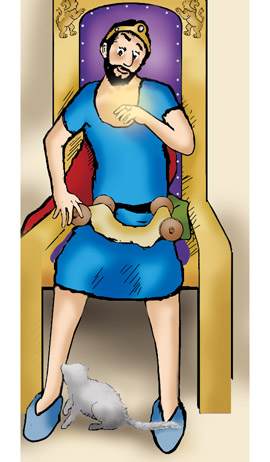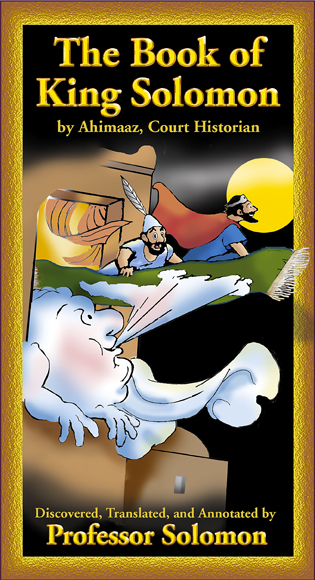
King Solomon and his ring
(from The Book of King Solomon)
![]()
![]()
The Ring of King Solomon
According to the Talmud, Solomon’s ring was engraved with the shem ha-meforesh—the Ineffable Name of GOD. And Islamic authors tell us that it contained “the Most Great Name of GOD,” along with four jewels that had been given to Solomon by angels.
In the Islamic accounts, however, the jewels are said to be inscribed with phrases. The first jewel gave Solomon dominion over the winds, and was inscribed “To GOD [Allah] belong power and greatness.” The second gave him dominion over birds and beasts, and was inscribed “Let all living things praise GOD.” The third gave him dominion over earth and water, and was inscribed “Heaven and earth are the servants of GOD.” The fourth gave him dominion over the jinn, and was inscribed “There is no GOD but GOD, and Muhammad is His messenger.” (Muhammad, of course, was not born until many centuries after the angels brought Solomon the jewels. The anachronism can be explained by the fact that angels exist outside of time.)
The ring served King Solomon as a signet ring, for sealing letters and decrees. But it was also the source of his supernatural powers. With it he was able to control the winds, and to fly about on a wind-borne carpet. It allowed him to communicate with animals (and even with flowers). But its most notable use involved the jinn. By means of his ring, Solomon could summon these otherworldly spirits and make them do his bidding. He could also exorcise them from possessed persons.
Did Solomon’s ring actually contain jewels given to him by angels? After a fashion, reports Nicholas Roerich, a Russian mystic who traveled in Tibet during the 1920s. According to Roerich, the ring was set with a fragment of the Chintamani Stone. This ancient stone (described as a chunk of moldavite with glowing striations) had been preserved in a lamasery that Roerich visited. The abbot presented Roerich with a fragment of it, and revealed that the stone had been brought to earth by a messenger from Sirius. Another fragment, said the abbot, had been presented to Emperor Tazlovoo of Atlantis, and another to King Solomon.
So the ring may have contained a fragment of the Chintamani Stone. What it did not contain was a so-called Solomon’s Seal. A hexagram or pentagram, Solomon’s Seal is the magical symbol par excellence. But it did not arise until medieval times, appearing on amulets that sought an association with King Solomon and his ring.
And one final description of the ring has come down to us. It is found in a Yiddish folk tale. The tale goes as follows:
King Solomon was sitting on his throne one morning, And he decided that Benaiah, the captain of the Palace Guard, needed a lesson in humility. So the king summoned Benaiah and gave him an impossible mission to fulfill. “I have heard rumors of a fabulous ring,” said Solomon. “It has a unique power. When a sad man gazes upon it, he becomes happy. But when a happy man gazes upon it, he becomes sad. Find this ring and bring it to me.”
Benaiah set out in search of the ring. He traveled from town to town, inquiring as to its whereabouts. But no one had ever heard of such a ring. And he was about to give up when he spotted a junk shop, whose proprietor was sitting out front. Benaiah approached the man and described the object of his search.
“A ring that cheers the sad and saddens the cheerful?” said the junk dealer. “Come inside.”
They entered the shop. From a boxful of baubles the junk dealer took a plain, silver ring. He engraved some words on it and gave it to Benaiah. Benaiah read the inscription, nodded sagely, and headed back to the palace.
Solomon was expecting an unsuccessful—and humbled—Benaiah. So when Benaiah strode in and handed him the ring, the king was taken aback. Inspecting it, he read the inscription—and let out a melancholy sigh.
King Solomon removed his costly rings and slipped on the ring from the junk shop. “It was I who needed a lesson in humility,” he said. “This ring has reminded me that wealth and power are fleeting things.”
For inscribed on the ring was a Yiddish phrase:
GAM ZU YAAVOR (“This too shall pass”)
(from The Book of King Solomon)

